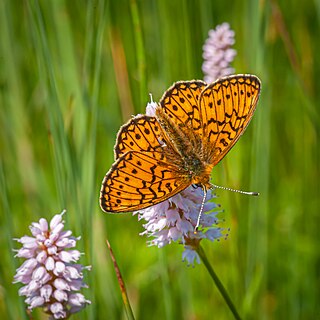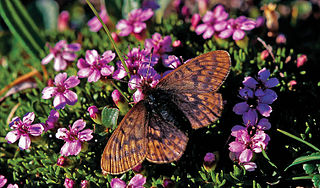
Boloria selene, known in Europe as the small pearl-bordered fritillary and in North America as the silver-bordered fritillary, is a species of butterfly of the family Nymphalidae. It is found across Europe, Asia and North America, and feeds exclusively on violets in its larval stages. This species prefers wet grassland habitats, where its larval food source, violets, are found. It overwinters in its larval stage, and eggs hatch in the late summer to early autumn. Members of this species are prey for multiple types of birds and other insects.

The pearl-bordered fritillary is a butterfly of the family Nymphalidae found in Europe and through Russia across the Palearctic to the north of Kazakhstan.

The Uncompahgre fritillary butterfly is a species of butterfly in the Order Lepidoptera: Family Nymphalidae that is endemic to Colorado, USA.

Boloria is a brush-footed butterfly (Nymphalidae) genus. Clossiana is usually included with it nowadays, though some authors still consider it distinct and it seems to warrant recognition as a subgenus at least.

Boloria eunomia, the bog fritillary or ocellate bog fritillary is a butterfly of the family Nymphalidae.

Boloria bellona, the meadow fritillary, is a North American butterfly in the brushfoot family, Nymphalidae. The common name, meadow fritillary, is also used for a European butterfly species, Melitaea parthenoides.

Boloria freija, the Freija fritillary, is a butterfly of the family Nymphalidae with a circumboreal distribution. It occurs in bogs and tundra. Its range includes Northern Europe to the north of 60° N, occasionally more southern locations, the Urals, Siberia, the Russian Far East, mountains of northern Mongolia and Hokkaido, as well as North America, extending in the Rocky Mountains to 35° N.

Boloria improba, the dingy fritillary, is a butterfly of the family Nymphalidae. In Europe it is only found in small parts of Scandinavia, more specifically the border region between Norway, Sweden and Finland. It is found in alpine or tundra habitats.

Boloria polaris, the Polaris fritillary, is a butterfly of the family Nymphalidae. It is found in northernmost Scandinavia, North America and in Greenland. It is also found in northeastern Russia and across the Palearctic to Chukotka. It is one of only six butterfly species found on Canada's Ellesmere Island.

Boloria napaea, the Napaea fritillary or mountain fritillary, is a butterfly of the family Nymphalidae.

Speyeria callippe, the callippe fritillary, is a North American species of butterflies in the brush-footed family Nymphalidae.

Speyeria mormonia, commonly known as the Mormon fritillary, is a North American butterfly belonging to the family Nymphalidae. It is highly diverse, having differentiated into several subspecies which occupy a wide geographic range. S. mormonia exhibits extreme protandry, which is the emergence of male adults before female adults. This has several consequences on male and female behavior. Habitat specificity is still being investigated, as there are few known environmental predictors, and S. mormonia appears to be associated with a wide range of habitats. This species is not under threat, and conservation efforts are generally not necessary.

Boloria epithore, the Pacific fritillary, is a butterfly of the family Nymphalidae. It is found in western North America from California to British Columbia and Alberta.
Boloria alberta, the Alberta fritillary, is a butterfly of the family Nymphalidae. It is found in the North American Rocky Mountains of British Columbia and Alberta and in northern Montana.














